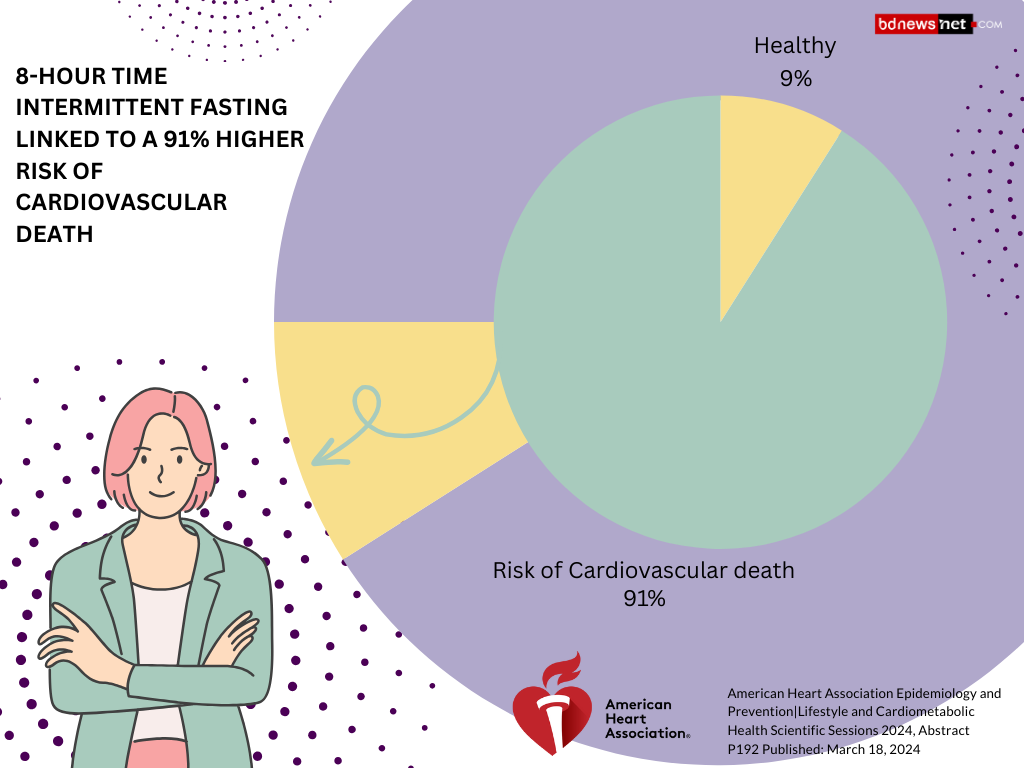Breaking News
Intermittent Fasting a Serious Health Risk: American Heart Association -???? Think Before You Fast ????

Are you one of the many intrigued by the allure of intermittent fasting? With promises of weight loss and improved health, it’s no wonder this diet trend has gained significant popularity. However, recent research has cast a shadow over its perceived benefits, raising questions about its safety and long-term effects on our well-being.
Join us as we delve into the fascinating world of intermittent fasting, exploring the latest findings and uncovering the potential risks hidden beneath its surface.In a world obsessed with quick fixes and instant results, intermittent fasting has emerged as a promising solution for those seeking to shed pounds and revitalize their health. Yet, beneath the glossy veneer of success stories lies a more nuanced truth. As new studies challenge the conventional wisdom surrounding this dietary approach, it’s time to take a closer look at the science behind intermittent fasting.
Key Research Findings on Intermittent Fasting and Cardiovascular Health
???? Study Population: Over 20,000 U.S. adults, followed for an average of 8 years.
???? Eating Schedule: Limiting food intake to less than 8 hours per day associated with a 91% higher risk of death from cardiovascular disease.
❤️ Health Conditions: People with heart disease or cancer also had an increased risk of cardiovascular death.
⏰ Comparison: Eating within a 12-16 hour window per day was not associated with increased mortality risk.
???? Demographics: Participants comprised approximately 73.3% non-Hispanic white adults, 11% Hispanic adults, 8% non-Hispanic Black adults, and 6.9% from other racial categories.
???? Cautionary Note: Patients, especially those with existing heart conditions or cancer, should be cautious about adopting time-restricted eating plans. Always consult with a healthcare professional before making significant changes to dietary regimens.
???? Embargoed Until: March 18, 2024, 3 p.m. CT/4 p.m. ET
???? Study Limitations: Reliance on self-reported dietary information and factors beyond eating patterns not included in the analysis.
???? Future Research Directions: Investigate biological mechanisms underlying associations, explore global applicability of findings.
???? Note: Statements and conclusions are solely those of the study authors and may not reflect the American Heart Association’s policy or position. Preliminary findings are subject to peer review and publication in scientific journals.
Stay informed, stay healthy! ????
A study presented at the American Heart Association’s Epidemiology and Prevention│Lifestyle and Cardiometabolic Scientific Sessions 2024 highlighted potential risks associated with time-restricted eating. Here are the key findings:
| Finding | Description |
|---|---|
| Increased Risk of Cardiovascular Death | Adults following an 8-hour time-restricted eating schedule had a 91% higher risk of death due to cardiovascular disease compared to those eating within 12-16 hours. |
| Risk among Heart Disease and Cancer Patients | Individuals with existing heart disease or cancer also experienced an increased risk of cardiovascular death. |
| No Increased Longevity | Limiting food intake to less than 8 hours per day did not result in living longer compared to the standard eating window of 12-16 hours. |
| Impact on Cancer Mortality | Eating duration of more than 16 hours per day was associated with a lower risk of cancer mortality among cancer patients. |
Study Details:
| Characteristic | Description |
|---|---|
| Total Number of Participants | Approximately 20,000 |
| Average Age | 49 years |
| Follow-Up Period | Median length of 8 years, maximum of 17 years |
| Enrollment Period | 2003-2018 |
| Inclusion Criteria | Participants aged at least 20 years |
| Completed two 24-hour dietary recall questionnaires within the first year of enrollment | |
| Gender Distribution | Approximately half identified as men |
| Approximately half identified as women | |
| Racial/Ethnic Distribution | 73.3% non-Hispanic white adults |
| 11% Hispanic adults | |
| 8% non-Hispanic Black adults | |
| 6.9% identified as another racial category, including mixed-race adults and adults of other non-Hispanic races |
- The study included over 20,000 U.S. adults with an average age of 49 years, followed for a median length of 8 years.
- Participants provided dietary information through the National Health and Nutrition Examination Surveys (NHANES).
- Limitations included reliance on self-reported dietary data and exclusion of other health factors from the analysis.
- Future research may explore biological mechanisms behind these associations and assess global applicability.
